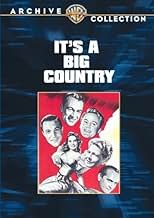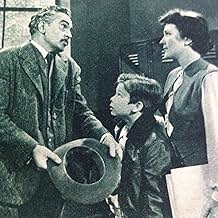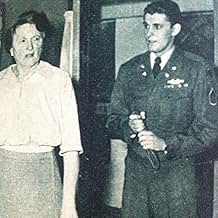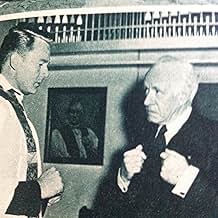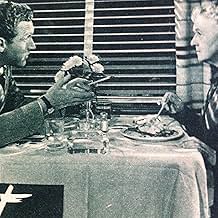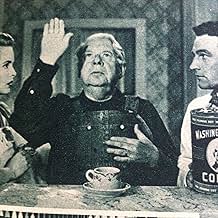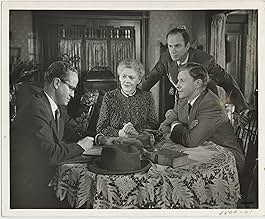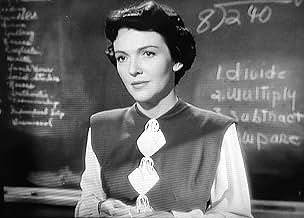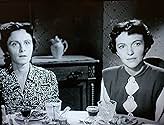Comprised of eight unrelated episodes of inconsistent quality, this anthology piece of American propaganda features some of MGM Studios' best directors, screenwriters and actors; it is narra... Read allComprised of eight unrelated episodes of inconsistent quality, this anthology piece of American propaganda features some of MGM Studios' best directors, screenwriters and actors; it is narrated by Louis Calhern.Comprised of eight unrelated episodes of inconsistent quality, this anthology piece of American propaganda features some of MGM Studios' best directors, screenwriters and actors; it is narrated by Louis Calhern.
- Miss Coleman
- (as Nancy Davis)
- Joey Esposito
- (as Bobby Hyatt)
Featured reviews
I had thought that the "episodic" film format was an invention of the 1980's art film. "It's a Big Country" killed that myth by presenting a film about the USA that is built on eight different episodes. The episodes are drawn together by a common narration, their focus on different ways of looking at the USA, and the introductory episode which lays out the concept for the film.
In the opening segment, James Whitmore rides a commuter train and tells another rider, "I love this country?" The other rider's response catches Whitmore off guard. "Which country?" He then points out that the USA is many countries -- political, military, religious, industrious, urban, rural, and many others. Each of the following seven segments of the film then focus on various ways of looking at the USA.
The actors in those seven segments are a "Who's Who" of 1950's film. The already mentioned Whitmore, Gene Kelly, Van Johnson, Gary Cooper, Janet Leigh and Keenan Wynn share the screen along with many others, including legends Ethel Barrymore and Fredric March. If you are a classic film lover, check out the list of credits and you'll find at least one favorite among the actors.
The film overall only comes across as average however -- it seems rather "preachy" on the concept of acceptance, and the happy endings of the segments come across too sugary. Fortunately the great acting in some of the segments pull them to the top of the heap. Gary Cooper's deadpan delivery combined with his Texas drawl in the one true comedy segment work's well. And the final segment in which a young immigrant boy finds he must wear glasses at the risk of ridicule of his father as well as his friends at school is equally appealing.
There is one glaring inconsistency in the film. The overall point seems to be that we must drop our racial stereotypes. To that end virtually every racial stereotype is presented and cut down. Each of the episodes of the film is presented as independent stories within the film -- little stories within the story. But when they presented the segment focusing on African American's, no story is given, only a narrated segment with stock shots of black America are presented. Not one known American actor of African descent is included. In this respect, Hollywood seems to have been unable to overcome it's own prejudice and exclusionary practices of that time.
You might enjoy portions of this film, but most persons will either stop part way through or fall asleep during this average film.
Wellmann and co tell us that America is a big country ,with big differences but where everybody has his place in the sun: in the "celebrities" segment,there are plenty of black artists such as Armstrong ,but the civil rights were ignored in 1949.
What saves this naive film containing more finer feelings than a Capra movie,is some kind of humor .Take the first scene on a train and the last sentence of the baffled traveler or the Hungarian daddy who does not want his daughters to marry a Greek,cause we are "enemies" .How great the melting pot is!And so are Gene Kelly and Janet Leigh.
Some stars only appear a few minutes:Gary Cooper tells us what a wonderful state "Lone Star" Texas is where oil spurts out everywhere under your feet;Ethel Barrymore plays a delightful old lady who is cross cause she was not counted when they took a census of the population.
The last sketch ,about glasses ,was perhaps not a very good choice to conclude the movie.
It was,is and will always be a big country.
It's a film with several different segments, some serious some pretty funny about every day Americans in all walks of life, in all parts of the then 48 states.
The two I liked best were those that ironically starred the two men who were not MGM contract players, Gary Cooper and Fredric March. Gary Cooper plays a Texas cowboy talking about his state and disillusioning us with a tongue in cheek delivery about the way Texans and Texas are perceived by the other 47 states. Of course Cooper's humor and the whole premise behind this segment was that Texas was our largest state in land mass. That ended in 1959 when Alaska became the 49th state, still it's the highlight of It's A Big Country.
Fredric March plays an Italian American father who's opposed to his son, Bobby Hyatt, getting needed glasses even after teacher Nancy Davis tells him it's necessary. He's got some old world ideas that need a bit of adjustment. March plays the role with dignity never do you feel he's a caricature.
Another episode that is nicely done involves Gene Kelly, Greek American boy falling for Janet Leigh, Hungarian American girl. They've got a problem though, her father played by Hollywood's number one Hungarian S.Z. Sakall. In the past 20 years we've seen a whole lot of stories about ancient ethnic hatreds coming out of Eastern Europe. Sakall is carrying some old grudges against Greeks though he really isn't sure why. Point being that here in America you're supposed to leave that all behind. That segment is still very much relevant.
Could we make It's A Big Country today? Not at this time, maybe at some future point when we've reached a national consensus that despite all our problems, America's a pretty good place after all.
An opening segment on a train, that draws us into the whole thing, features James Whitmore as a patriotic, "I love America" type. "Which America?" asks the always-debonair and well-spoken William Powell. We then see the many sides of our country depicted through vignettes.
There are a couple of segments against prejudice. One is about a Greek-hating Hungarian American father of several girls (S. Z. Sakall) whose eldest daughter (Janet Leigh) falls for a young Greek American (Gene Kelly - actually pushing 40 at the time but you'd never guess it). As a piece against xenophobia, it's nice, and gets its point across with humor, wit, and romance.
There's also a segment against religious prejudice, where an ex-seviceman named Maxie Klein (Keefe Brasselle) visits the mother (Marjorie Main) of a dead war buddy. At first the mother doesn't know the man because her son had used his nickname in his letters. She's suspicious of his motives because he's Jewish. Eventually she's grateful for the comfort the stranger has given her, putting aside whatever prejudices she was harboring, and requesting his mother's address so that she can write her about it all.
The segments are all fairly interesting, but not exactly first-rate drama or comedy.
There's one about a minister (Van Johnson) who learns a lesson in humility from a deacon (played by Louis Stone). There's one in which Fredric March plays a working-class Italian American who won't be convinced by a schoolteacher (Nancy Davis) his son needs glasses. Gary Cooper plays a cowboy in a humorous monologue about Texas. Louis Calhern narrates a documentary sequence about African Americans. Ethel Barrymore and George Murphy star in a dramatic sketch wherein an old Boston-Irish woman is upset because the US Census ignored her. Etc.
The overall effect is a little like picking up an old copy of Reader's Digest.
Without the stars, this would be very minor, indeed. With them, it becomes a big film. Not a great film, but, undoubtedly, a big one. It covers a lot of ground, and comes up a little bit short.
The film is made up of eight different stories. To me, this is the biggest weakness of the film. Perhaps paring it down to three or four stories would have worked better...especially since some of the stories are underdeveloped or just didn't work all that well. Here's a breakdown of the stories:
1. Two guys are on a train. One is a loudmouth (James Whitmore) and he strikes up a conversation with a guy who seems, at first, to just want a bit of peace and quiet (William Powell). This one was very forgettable and a bit stupid. This one merits a 3.
2. Ethel Barrymore plays a lonely widow who was somehow missed in the census. With the help of a newspaper editor (George Murphy) she gets counted. VERY schmaltzy and utterly ridiculous, this one is still very enjoyable and merits a 6.
3. In a tribute to the accomplishments of Black Americans, a montage of famous Blacks is shown while the narrator describes their many achievements and contributions. This is totally unlike most of the rest of the film and instead of a fictional story, it's a mini- documentary. For 1951, it's very liberal and positive...though folks today will likely think it's a bit of a 'whitewash' by making everything look too positive for this minority group. Despite this, I think it's quite good for the time in which it was made and I give it an 8.
4. Mr. Szabo (Cuddles Sakal) is a Hungarian man with many daughters...who he dearly loves. However, Mr. Szabo is a bigot when it comes to Greeks--he hates them and insists Hungarians ALWAYS will hate Greeks. Not surprisingly, his oldest daughter (Janet Leigh) ends up falling for a Greek (Gene Kelly) and this causes many problems...as well as forces Mr. Szabo to examine his own prejudices--hammering home the message that Americans should be united. However, I do wonder-- do Greeks and Hungarians really dislike each other? I don't think this has ever been true...and would love to know more from anyone who knows more about this. Making Kelly and his brothers Turkish-Americans...that would have made a lot more sense since there has been a long, long tradition of distrust and dislike between these groups. This segment easily could have been longer and more developed and was one of the more enjoyable segments thanks, as always, to the wonderful Cuddles Sakal. Of course, I'd love him in ANYTHING! 8.
5. A Jewish soldier (Keefe Brasselle) returns home from the Korean War. Among the first things he does is visit the mother (Marjorie Main) of a fallen buddy. The message is about more than tolerance for others but about our need for each other--and the strength Americans derive from its many ethnic groups. EXTREMELY preachy and schmaltzy but well done. 6.
6. This is a bizarre one. The narrator begins talking about Texas when Gary Cooper (dressed as a cowboy) interrupts and begins talking at length about his beloved Texas (though Cooper was actually from Montana!). It plays much like a travelogue...to a foreign country! This is among the shortest segments and is kind of funny...and forgettable. 6.
7. Van Johnson plays a young minister who has just arrived in Washington, DC and the church is the same one the President usually attends. His preaching sucks--mostly because he is more concerned with impressing the President than the congregation. Among the least watchable of the segments, 3.
8. Nancy Davis (Reagan) plays a school teacher who notices that an Italian-American kid cannot see very well...so she sends a note home. The father (Frederic March) is angry...his son sees just fine...or so he thinks. He's so upset he goes to see the teacher about this. Somehow, this idiotic father thinks that needing glasses is the same has having a hearing problem. Huh?! Well, regardless, the teacher has a tough time getting through to him. This segment seems to have less lot to do with the overall theme of the film but was okay otherwise. 5.
Overall, this is a fair film--with several really good portions and several which just don't work well. In many cases, by allowing the story to slowly reveal itself would have made the message less preachy and obvious. Subtle, it ain't but an interesting little experimental film.
Did you know
- TriviaWhen she discovers that Icarus Xenophon (Gene Kelly) is Greek, Janet Leigh does a spot-on imitation of S.Z. "Cuddles" Sakall's (S.Z. Sakall) trademark response to upsetting news, placing her palms against her cheeks and emitting an exasperated "Sheeeesh!"
- GoofsWhen the census taker asks Ethel Barrymore her name, she replies "Mrs. Brian Patrick Riordan" and he writes it down. Always with censuses, a woman's given name is entered.
- Quotes
Rosa Szabo Xenophon: Marry me? You don't know anything about me.
Icarus Xenophon: You're a girl. You're pretty and you're modest. What else is there to know?
- ConnectionsEdited into A Letter from a Soldier (1951)
- How long is It's a Big Country: An American Anthology?Powered by Alexa
Details
- Release date
- Country of origin
- Languages
- Also known as
- It's a Big Country
- Filming locations
- 1772 Church Street NW, Washington, District of Columbia, USA(St. Thomas Episcopal Church - where Rev. Birch was assigned)
- Production company
- See more company credits at IMDbPro
Box office
- Budget
- $1,013,000 (estimated)
- Runtime1 hour 29 minutes
- Color
- Aspect ratio
- 1.37 : 1
Contribute to this page


